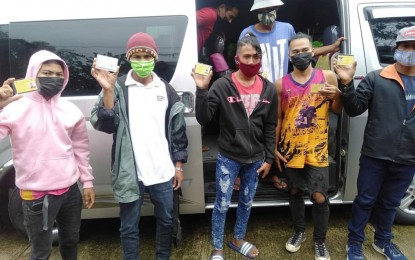
INSURANCE. Antique’s sugar migrant workers show their identification cards issued by the Sacada Desk before their departure to work in the sugar plantations of Negros Occidental on Sept. 10, 2021. Randy Ardeño, in charge of the Sacada Desk, said in an interview on Friday (Jan. 7, 2022) that the provincial government of Antique has provided the "sacadas" with various support, including requiring their contractors to provide them with Social Security System insurance. (Photo courtesy of Sacada Desk)
SAN JOSE DE BUENAVISTA, Antique – The year 2021 saw about 4,203 active sugar plantation migrant workers or "sacadas" from this province enrolled in the Social Security System (SSS).
Randy Ardeño, in charge of the Sacada Desk of the Antique Provincial Planning and Development Office (PPDO), said in an interview Friday that last year, upon the direction of Governor Rhodora J. Cadiao, the long-coveted dream of the "sacadas" to be enrolled in the SSS was made a requirement for the contractors.
Cadiao made the request in July 2021 to the Department of Labor and Employment (DOLE), which issues the migratory workers' permit and authority to travel.
“During our collaboration meeting with the DOLE, we discussed the request of the governor for the labor department to make it as a requirement among the contractors that they will have to enroll the 'sacadas' they will be hiring with the SSS,” Ardeño said. “Before the SSS was made as a requirement, the contractors and even the planters were given leeway whether they would only enroll the sacadas with the SSS or not.”
Previously, whenever sugar migrant workers suffer an accident in Negros Occidental, they would come home to Antique penniless because they had to pay for their medical bills.
It was also common for the family of the injured "sacada" to seek help from the Antique provincial government for the Aid to Individuals in Crisis Situation (AICS) through the Provincial Social Welfare and Development Office (PSWDO) for their medication.
“With their SSS enrollment, the 'sacadas' have now the insurance benefit that they could claim, aside from the AICS provided them,” Ardeño said.
In a previous interview, SSS-Antique information officer Leory Ninora said the "sacadas" enrolled in the SSS could avail of such claims as disability, sickness, death, and maternity for women.
Likewise, they are now entitled to avail of the retirement benefit after 120 months of paying their premium or get a salary loan by paying the monthly premium of PHP400 per month.
However, the migratory workers' SSS enrollment is just the first step being taken by the provincial government for their protection.
It is also eyeing to allocate funds for the continued SSS insurance of the sugar migrant workers who will opt to stay for good and work in the province.
“The provincial government then intends to pay for the SSS premium of the 'sacadas' who will no longer be returning to work in Negros Occidental under their contractor,” Ardeño said.
‘Bisita Sacada’
Ardeño said the yearly “Bisita Sacada”, or the visit of Cadiao and the provincial board members to check on the situation of the sugar migrant workers in Negros Occidental, resumed on Dec. 3-5, 2021.
The annual visit was halted in 2020 due to the coronavirus disease 2019 (Covid-19) pandemic.
Last Christmas, Cadiao, together with members of the Provincial Health Office, went back to Negros Occidental bringing grocery items, medicines, and free medical consultations for sugar migrant workers.
Antique social workers also interviewed the "sacadas" for their requested AICS.
“We also distributed 20 lechon or roasted pig to the contractors on December 20 for the 'sacadas' to share,” Ardeño said.
Every year since 2018, when the Sacada Desk was established, they have released 120 livelihood assistance to the workers and their families.
“The 'sacadas' for their livelihood assistance were made to choose whether they would like to put up a grocery store or raise cattle for their farm,” he said.
The livelihood assistance amounts to PHP10,000 for each beneficiary.
The active "sacadas" usually return to Negros Occidental starting September for the milling season, and with the livelihood assistance from the local government, the workers are confident that they have left a source of income for their families to survive the six months that they would be gone, Ardeño added.
“The DOLE, through our assistance, also holds (a) pre-departure orientation seminar so that the 'sacadas' will know their rights and privileges and whom to contact in case of emergency.”
The Sacada Desk orients the sugar migrant workers bound for Negros Occidental about their wage, which ranges from PHP170 to PHP200 per day, and issues identification cards.
Education for children of 'sacadas'
“As long as there is work to be provided for the 'sacadas' in Negros Occidental, we expect them to continue working in the sugar fields there because it has been their occupation ever since, but Governor Cadiao is really working hard to provide educational assistance for their children so that their status in life will improve,” Ardeño said.
The provincial government is looking into providing scholarships for the children of the sugar migrant workers starting this year "to guarantee that at least one of their kids will be able to finish college," he added.
In 2020, about 2,232 "sacadas" were hired to work in the fields of Negros Occidental by 63 contractors during the milling season.
The "sacadas" work mostly as cane cutters in the vast sugar plantations in the province dubbed the “sugar capital” of the Philippines. (PNA)
